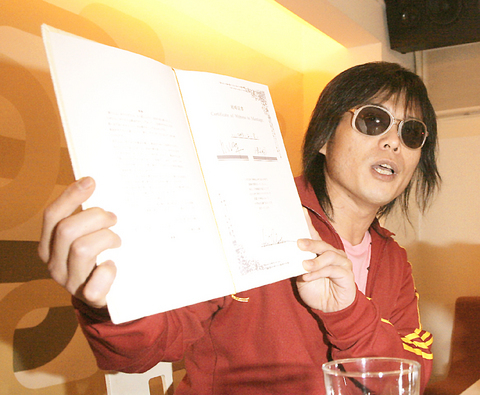This week's edition of TVBS Weekly broke some big news when it reported that Wu Bai (
The singer emerged to confirm their marriage, but corrected the report by announcing that the two actually tied the knot in Fukuoka, Japan, in 2003. The couple had kept their marriage a secret because, according to Wu Bai, "telling everyone wouldn't be fun." He denied, however, that the announcement was made because they were expecting a kid.
Last week the gossip rags in Taiwan and Hong Kong thought they'd struck gold when they released photos of Taiwanese pop diva Chang Hui-mei (A-Mei,

PHOTO: TAIPEI TIMES
Next Magazine (
Speaking of Tsai, she released a new album titled J-Game over the weekend. Ever since her emphatic split with Jay, when he was spotted in Japan with TV anchorwoman Patty Hou (
Finally, model fever in Taiwan has elicited a backlash, and leave it to bad boy rocker Chang Chen-yue (

PHOTO: TAIPEI TIMES
S.H.E. had a close brush with politics over the weekend, when a newspaper in Lanzhou, China, reported that the band had said that they weren't Chinese, but were Taiwanese. Not wanting to attract any part of the nationalist hysteria that's raged in China over the past several weekends, the girl band moved quickly to defuse the potential controversy by confirming that they had never been to Lanzhou and never been interviewed by any paper based there. They also noted in an open letter to the Great Daily News (

PHOTO: TAIPEI TIMES

When nature calls, Masana Izawa has followed the same routine for more than 50 years: heading out to the woods in Japan, dropping his pants and doing as bears do. “We survive by eating other living things. But you can give faeces back to nature so that organisms in the soil can decompose them,” the 74-year-old said. “This means you are giving life back. What could be a more sublime act?” “Fundo-shi” (“poop-soil master”) Izawa is something of a celebrity in Japan, publishing books, delivering lectures and appearing in a documentary. People flock to his “Poopland” and centuries-old wooden “Fundo-an” (“poop-soil house”) in

Jan 13 to Jan 19 Yang Jen-huang (楊仁煌) recalls being slapped by his father when he asked about their Sakizaya heritage, telling him to never mention it otherwise they’ll be killed. “Only then did I start learning about the Karewan Incident,” he tells Mayaw Kilang in “The social culture and ethnic identification of the Sakizaya” (撒奇萊雅族的社會文化與民族認定). “Many of our elders are reluctant to call themselves Sakizaya, and are accustomed to living in Amis (Pangcah) society. Therefore, it’s up to the younger generation to push for official recognition, because there’s still a taboo with the older people.” Although the Sakizaya became Taiwan’s 13th

For anyone on board the train looking out the window, it must have been a strange sight. The same foreigner stood outside waving at them four different times within ten minutes, three times on the left and once on the right, his face getting redder and sweatier each time. At this unique location, it’s actually possible to beat the train up the mountain on foot, though only with extreme effort. For the average hiker, the Dulishan Trail is still a great place to get some exercise and see the train — at least once — as it makes its way

Earlier this month, a Hong Kong ship, Shunxin-39, was identified as the ship that had cut telecom cables on the seabed north of Keelung. The ship, owned out of Hong Kong and variously described as registered in Cameroon (as Shunxin-39) and Tanzania (as Xinshun-39), was originally People’s Republic of China (PRC)-flagged, but changed registries in 2024, according to Maritime Executive magazine. The Financial Times published tracking data for the ship showing it crossing a number of undersea cables off northern Taiwan over the course of several days. The intent was clear. Shunxin-39, which according to the Taiwan Coast Guard was crewed